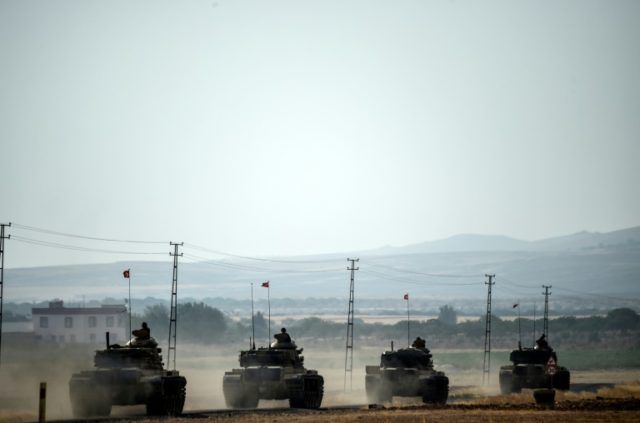The Turkish National Security Council issued a statement on Tuesday that “Operation Peace Spring,” the Turkish invasion of northeastern Syria, will continue despite cease-fire agreements brokered with the United States and Russia.
“We expect the parties in the Safe Zone Agreement in Syria to complete the clearance of terrorists as soon as possible, including Tal Rifaat and Manbij,” said the council, known by its Turkish acronym MGK.
The “safe zone” is the region of Syria near the Turkish border that Turkey has said all Kurdish militia forces must withdraw from. The Kurdish-led Syrian Democratic Forces (SDF) said last week they would withdraw from the city of Manbij, to be replaced by soldiers from the Syrian army.
The SDF includes forces from the Syrian Kurdish YPG militia, which Turkey accuses of working with the violent PKK separatist party in Turkey. Turkish media and politicians routinely describe the YPG as a wing of the PKK or treat the two organizations as indistinguishable.
Joint Turkish and Russian patrols have been operating near Manbij and Tal Rifaat since early November. The SDF captured Tal Rifaat from the Islamic State in 2016, to the great alarm of Turkey, which warned the Kurds not to push any closer to its border. When the ceasefire went into effect in late October, there were thought to be about a thousand YPG fighters each in Manbij and Tal Rifaat.
The MGK insisted Turkey’s mission in Syria is to fight terrorists, including the remnants of the Islamic State, and called for the international community to support “Operation Peace Spring” on those grounds, as well as supporting Turkey’s efforts to return refugees to Syria.
“We hereby call on the international community to support Turkey that aims to reinstate peace and welfare for the Syrian people, without any ethnic or religious discrimination,” the council said.
Turkish politician Mustafa Destici, head of the Grand Unity Party (BBP), said on Wednesday that Turkey should establish permanent fortified positions in northern Syria.
“Just as the U.S. and Russia set up bases, Turkey should not hesitate to make such kind of formations,” Destici said.
Turkish President Recep Tayyip Erdogan complained during his visit to Washington in mid-November that Kurdish “terror groups” still held positions in Manbij, Tal Rifaat, and other towns near the “safe zone,” despite American, Russian, and Syrian promises to remove them.
“Unfortunately as of now it is not possible to say terror groups have withdrawn from the region,” Erdogan said. “Neither Russia nor the United States could remove terror groups within the given hour and the given day.”
Russian Foreign Minister Sergei Lavrov said on Tuesday that his government has been given no indication that Turkey plans to resume military activities in Syria.
“With regard to the implementation of the Russian-Turkish Memorandum signed on the 22nd of October, we have no information indicating Turkey’s intention to violate it. October, we got the approval to implement it and, above all, the approval of Syrian President Bashar al-Assad, and the approval of the Kurdish leadership, which has strongly confirmed that it will cooperate,” Lavrov said.
Lavrov said last week that Turkey assured Russia it is not planning to launch any new operations in Syria.
On Wednesday, Lavrov gave Kurdish leaders an ominous warning that they should “stick to their word” on withdrawing from the border region, accusing them of losing “enthusiasm for cooperation” after U.S. troops resumed patrols in the region.
“I would advise our Kurdish colleagues to be consistent and refrain from taking questionable actions as the situation changes,” he said.

COMMENTS
Please let us know if you're having issues with commenting.